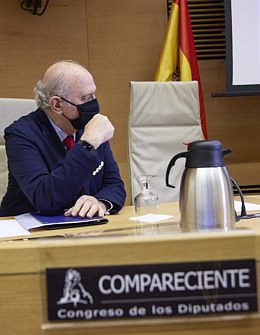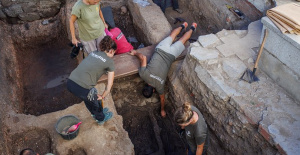The PSOE has promised two more investigative commissions that Junts wants to use to expand the amnesty and include the alleged 'lawfare'
MADRID, 11 Nov. (EUROPA PRESS) -
Congress already concluded in 2017 that the Ministry of the Interior of Mariano Rajoy's first government used public resources to "persecute political adversaries", including Catalan nationalists and independence supporters, but that ruling did not lead to judicial proceedings. Now the PSOE has agreed with ERC and Junts two other investigation commissions on the Interior and the independence movement, and that is where those of Carles Puigdemont want to take advantage of to expand the scope of the amnesty and include the so-called 'lawfare'.
Specifically, the investiture agreement sealed this Thursday between the PSOE and Junts speaks of the constitution of "investigation commissions" whose conclusions "will be taken into account in the application of the amnesty law to the extent that situations may arise in the concept of 'lawfare' or judicialization of politics, with the consequences that, where appropriate, may give rise to liability actions or legislative modifications".
They refer to the two investigative commissions that the PSOE accepted last August to add the vote of the independentistas to the candidacy of Francina Armengol for the Presidency of Congress and thus gain the majority in the Chamber Table.
One will be dedicated to investigating the alleged espionage of pro-independence politicians with the 'Pegasus' program and the other will refer to alleged connections of the CNI with the preparation of the terrorist attacks of August 17, 2017, two topics that until then the PSOE refused to investigate. .
But Congress has in recent years analyzed the so-called 'sewers' of the Police, both its maneuvers against the Government's adversaries and to cover up corruption investigations that affected the PP (Operation Kitchen, now about to be judged).
Thus, the so-called 'Operation Catalonia' was already the subject of an investigation in Congress in 2017, within the framework of parliamentary investigations into the alleged "partisan" use of the Ministry of the Interior, under the mandate of the 'popular' Jorge Fernández Díaz.
After the pertinent round of interrogations, in July 2017 the Chamber concluded that, indeed, a police structure was created intended, among other things, to "persecute" political adversaries such as leaders of the Catalan independence movement.
In addition to the former Minister of the Interior, the 'popular' Jorge Fernández Díaz, the former director general of the Police Ignacio Cosidó and the former deputy operational director (DAO) of the Police Eugenio Pino were identified as politically responsible for the "partisan" use of this department.
"A police structure was created to hinder the investigation of corruption scandals that affected the Popular Party and the monitoring, investigation and, where appropriate, the persecution of political adversaries," read the conclusions that the Plenary of Congress approved with the votes of PSOE, Unidos Podemos, ERC, PNV, and PDeCAT, and the abstention of Ciudadanos.
Specifically mentioned was "the creation and work carried out by the BARC" (Brigade for Analysis and Review of Cases) against the PSOE, the false account in Switzerland of Xavier Trías, or the so-called "PISA Report" against Podemos on alleged economic activities of Pablo Iglesias.
In any case, that ruling did not lead to judicial proceedings. Unidas Podemos, ERC and the PDeCAT tried to have these conclusions sent to the Prosecutor's Office in case criminal consequences could be derived from them, but PP, PSOE, Cs and the PNV opposed them. In that debate, the president of the commission, Mikel Legarda, of the PNV, recalled that, in any case, it would be the Congress Board that would have to decide whether to inform the Public Ministry.
In this context, both the PSOE and the PNV stressed that the mission of the commission was to point out political, not criminal, responsibilities, and that, in any case, the Prosecutor's Office would be aware of the result of the investigation through its publication in the Congress Bulletin and who could always act ex officio.
And in March of this same year, Congress created a new commission of investigation regarding what are known as 'sewers' of the State. It was made at the request of a request that the pro-independence parties had registered nine months earlier to open investigations into the alleged interference in the sovereignty of the Principality of Andorra by Spanish political leaders, as well as parapolice networks within the framework of the so-called 'Operation Catalonia'.
Later, the PSOE included among the objectives of the investigation what was known as 'Operation Kitchen', which had already been the subject of another commission previously. However, the vetoes crossed between parties to call witnesses led to only time being given to former commissioner José Manuel Villarejo. In May, the commission declined with the dissolution of the Cortes due to the early call of the general elections.
Now Junts wants to take advantage of the new promised investigation commissions to delve deeper into the amnesty for pro-independence supporters prosecuted over the last ten years. Former Catalan president Carles Puigdemont wants what Congress decides to serve to demonstrate the alleged 'lawfare' and thus review other causes that affect co-religionists.
Precisely that mention of 'lawfare' in the agreement between the PSOE and Junts stirred up the main judicial associations and the General Council of the Judiciary, who interpreted that Congress was going to supervise the actions of the courts.

 Exploring Cardano: Inner Workings and Advantages of this Cryptocurrency
Exploring Cardano: Inner Workings and Advantages of this Cryptocurrency Seville.- Economy.- Innova.- STSA inaugurates its new painting and sealing hangar in San Pablo, for 18 million
Seville.- Economy.- Innova.- STSA inaugurates its new painting and sealing hangar in San Pablo, for 18 million Innova.- More than 300 volunteers join the Andalucía Compromiso Digital network in one month to facilitate access to ICT
Innova.- More than 300 volunteers join the Andalucía Compromiso Digital network in one month to facilitate access to ICT Innova.-AMP.- Ayesa acquires 51% of Sadiel, which will create new technological engineering products and expand markets
Innova.-AMP.- Ayesa acquires 51% of Sadiel, which will create new technological engineering products and expand markets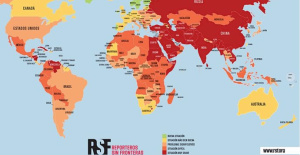 Spain moves from 36th to 30th place in RSF's world press freedom ranking but political pressure increases
Spain moves from 36th to 30th place in RSF's world press freedom ranking but political pressure increases Spain receives 16.1 million tourists until March and registers the best first quarter in history
Spain receives 16.1 million tourists until March and registers the best first quarter in history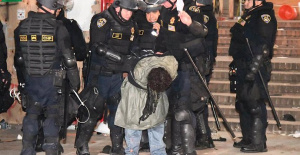 More than 2,000 arrested during pro-Palestinian protests at US universities
More than 2,000 arrested during pro-Palestinian protests at US universities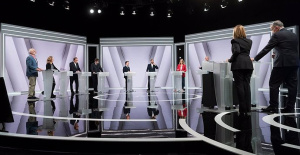 Illa advocates for a "transversal" Government and Junts rules out agreeing with the socialists
Illa advocates for a "transversal" Government and Junts rules out agreeing with the socialists How Blockchain in being used to shape the future
How Blockchain in being used to shape the future Not just BTC and ETH: Here Are Some More Interesting Coins Worth Focusing on
Not just BTC and ETH: Here Are Some More Interesting Coins Worth Focusing on UPV students design an app that helps improve the ventilation of homes in the face of high temperatures
UPV students design an app that helps improve the ventilation of homes in the face of high temperatures Ivace and promotes a less invasive device for the early detection of prostate cancer
Ivace and promotes a less invasive device for the early detection of prostate cancer Valencia unanimously approves the ordinance to allocate spaces to test innovative initiatives
Valencia unanimously approves the ordinance to allocate spaces to test innovative initiatives UPV researchers promote a paid master's degree as a "talent factory" in integrated photonics
UPV researchers promote a paid master's degree as a "talent factory" in integrated photonics A million people demonstrate in France against Macron's pension reform
A million people demonstrate in France against Macron's pension reform Russia launches several missiles against "critical infrastructure" in the city of Zaporizhia
Russia launches several missiles against "critical infrastructure" in the city of Zaporizhia A "procession" remembers the dead of the Calabria shipwreck as bodies continue to wash up on the shore
A "procession" remembers the dead of the Calabria shipwreck as bodies continue to wash up on the shore Prison sentences handed down for three prominent Hong Kong pro-democracy activists
Prison sentences handed down for three prominent Hong Kong pro-democracy activists ETH continues to leave trading platforms, Ethereum balance on exchanges lowest in 3 years
ETH continues to leave trading platforms, Ethereum balance on exchanges lowest in 3 years Investors invest $450 million in Consensys, Ethereum incubator now valued at $7 billion
Investors invest $450 million in Consensys, Ethereum incubator now valued at $7 billion Alchemy Integrates Ethereum L2 Product Starknet to Enhance Web3 Scalability at a Price 100x Lower Than L1 Fees
Alchemy Integrates Ethereum L2 Product Starknet to Enhance Web3 Scalability at a Price 100x Lower Than L1 Fees Mining Report: Bitcoin's Electricity Consumption Declines by 25% in Q1 2022
Mining Report: Bitcoin's Electricity Consumption Declines by 25% in Q1 2022 Oil-to-Bitcoin Mining Firm Crusoe Energy Systems Raised $505 Million
Oil-to-Bitcoin Mining Firm Crusoe Energy Systems Raised $505 Million Microbt reveals the latest Bitcoin mining rigs -- Machines produce up to 126 TH/s with custom 5nm chip design
Microbt reveals the latest Bitcoin mining rigs -- Machines produce up to 126 TH/s with custom 5nm chip design Bitcoin's Mining Difficulty Hits a Lifetime High, With More Than 90% of BTC Supply Issued
Bitcoin's Mining Difficulty Hits a Lifetime High, With More Than 90% of BTC Supply Issued The Biggest Movers are Near, EOS, and RUNE during Friday's Selloff
The Biggest Movers are Near, EOS, and RUNE during Friday's Selloff Global Markets Spooked by a Hawkish Fed and Covid, Stocks and Crypto Gain After Musk Buys Twitter
Global Markets Spooked by a Hawkish Fed and Covid, Stocks and Crypto Gain After Musk Buys Twitter Bitso to offset carbon emissions from the Trading Platform's ERC20, ETH, and BTC Transactions
Bitso to offset carbon emissions from the Trading Platform's ERC20, ETH, and BTC Transactions Draftkings Announces 2022 College Hoops NFT Selection for March Madness
Draftkings Announces 2022 College Hoops NFT Selection for March Madness